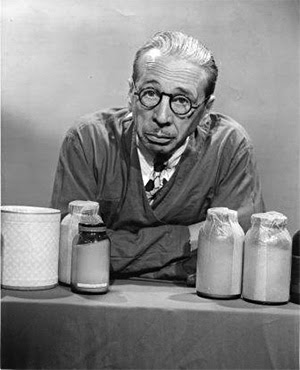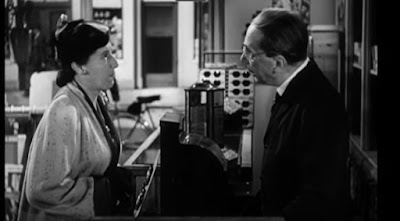Richard LaGrand made his film debut in 1943 when Gildersleeve’s
Bad Day (1943) was released a couple of months before his 61st
birthday. This age is not usually the
time of life most of us are allowed to embark on a new career, or even a new
facet of our careers, but Hollywood, despite its penchant for youth and glamor,
did provide opportunities for elders, even newcomers who were elders, that
other fields did not.
This is my contribution to the Classic Movie Blog
Association’s “Screen Debuts and Last Hurrah’s Blogathon.” Have a look here at some swell participating blogs.
Mr. LaGrand may have been a newbie to film, but he started his acting career in 1901. The trope
event occurred that, as a stagehand, he was called upon to perform when an
actor didn’t show – and LaGrand apparently never looked back. He trod the boards in theater, tent shows,
and vaudeville for decades, playing character parts and learning many dialects,
which would help him later on when he entered radio.
He was introduced to radio in 1928 or 1929, depending on the
source, playing Professor Knicklebine in a program called School Days at
the age of 47. Radio was fertile ground
in the 1930s and 1940s for actors, stars as well as character players, but
especially welcome to those players who, as the snarky saying went at the time,
“had a face for radio.” It was a highly
creative form of media, and in calling upon the imaginations of its listeners,
allowed for writing and scenarios where the sky was the limit even on a limited
budget. The storytelling on radio was
often glorious, a boon not only to actors but to writers.
In 1942, Mr. LeGrand landed a radio role for which he would
be known and beloved, pharmacist Mr. Peavey on The Great Gildersleeve.
The character of Throckmorton P. Gildersleeve began on the
popular Fibber McGee and Molly show, and was given his own show in a new
scenario in a new town with niece Marjorie and nephew Leroy (played by the
incomparable Walter Tetley – see this previous post), and wonderful Lillian Randolph as their cook and housekeeper Birdie Lee Coggins (see this previous post). Though Gildersleeve, played at
this time by Harold Peary (later on by Willard Waterman) was a larger-than-life
character, in no way did he outshine the supporting players, which also
included several people in town, Mr. Peavey foremost among them. It seemed as
if just about every day Gildersleeve or his family had to stop in the drug
store for something, engaging the mild-mannered pharmacist in conversation. Openings were always left for Peavey’s
trademark vacillating response, “Well now, I wouldn’t say that.”
Radio programs were such popular entertainment that,
invariably, Hollywood plucked certain personalities for the screen, and
sometimes, would lift the program itself out of the airwaves to the big screen
in an attempt to lure its fans into the theaters. This happened, film buffs and old time radio
buffs may agree, with varying degrees of success. Radio, after all, was not just a story
without pictures. There were plenty of
pictures; they were just in one’s mind.
The unique media did not always transfer well to the big screen.

Gildersleeve’s Bad Day (1943), in which Richard
LaGrand had his screen debut, (actually, we have a two-for here: Barbara Hale—future Della Street to Perry
Mason also made her screen debut as one of Marge’s friends) was actually the
second in a series of four Gildersleeve B-movies, each lasting a little over an
hour long and featuring many of the radio show’s characters, but not always the
same actors who played them on radio.
The most obvious to come to mind would be Walter Tetley, who could not
repeat his lively little Leroy on film because Tetley was not a child; he was a
grown man, despite the quality of his voice.
Niece Marjorie and Judge Horace Hooker are played by different actors as
well. There is a loss of chemistry
between these characters as a result, they really don’t seem to be the same
characters we know from radio. Also, the
setting of Gildersleeve’s home might not appear the same way on screen as one
imagines it. It doesn’t for me.

I think the only really familiar setting, to
me, in this movie is Peavey’s drug store, and that may be because a lot of drug
stores of the era looked pretty similar, so there was no going wrong with a
lunch counter and fairly small shop with a back wall with shelves of products
and nostrums. Most especially familiar
is Mr. Peavey standing behind the counter, slightly hunched, speaking in his
careful, nasal-toned speech, always willing to make observations but with a
gentlemanly hesitancy to offer a definite opinion, lest he offend. He sometimes muttered wry amusing comments in which he cracked himself up.

In the radio show, he is Richard Peavey (married to “Mrs.
Peavey,” whom he always refers to as “Mrs. Peavey”) but the movie calls him J.
W. Peavey, for no apparent reason. The
plot is contrived and slapstick, and enjoyable for its ridiculousness and quick
pace. Gildersleeve, Mr. Peavey, and
several other men in town are subpoenaed to sit on a jury in a case involving a
local gangster. While the other men in
town regret being plucked from their daily lives to sit on a jury, Gildersleeve
relishes in it. With his childlike
pomposity, he thinks he has been chosen in deference to his superior intellect,
and he quickly tries to take center stage, as he usually does on any occasion, even
arguing from the jury box as if he is a defense attorney. He is the lone vote holding out when it is
time for the jury to deliberate, and with limited facilities to keep the jury
sequestered in town, all the men are brought to Gildersleeve’s home to sleep overnight,
watched by the bailiff.
Gildy gets into some trouble with the gangsters, and the law
as well when it looks like he has stolen money from Judge Hooker’s safe, but
all comes right, and Peavey gets the last word.
As Gildy is recovering in a hospital bed, he implores his friends to
believe his side of the story, and turns to his old buddy. “You believe me, don’t you, Peavey?”
To which Mr. Peavey, of course, replies, “Well now, I
wouldn’t say that.”
The popularity of Mr. Peavey can be attested to his taking a
more prominent role in the next movie in the series, Gildersleeve on
Broadway (1943), in which Peavey takes Gildersleeve to New York to help him
convince a wealthy drug company owner (Big Pharma being represented in this
case by dotty Billie Burke) to renew a contract with the druggists at their
druggists’ convention. Gildy also wants
to spy on Marjorie’s boyfriend, thinking he might be a playboy. Taking the characters out of their hometown
of Summerfield actually helps the movie, since we have no familiar settings to
compare to the ones already in our imagination.


Particularly enjoyable in this romp is the cameo by Walter
Tetley as a bell hop, who with his Brooklynese speech sounds more like his smart
aleck character on the Phil Harris and Alice Faye Show rather than
Leroy. Mr. Peavey comes off as less
befuddled in this movie, more decisive, and his efforts to keep Gildy out of
trouble include dressing in drag to pretend to be Gildy’s wife in order to
discourage Bille Burke from forcing Gildersleeve to marry her. He’s a hoot.
At one point, the butler at a party Peavey tries to crash in drag
mistakes Peavey, who has announced he is Mrs. Gildersleeve, for Gildy’s
mother. Insulted, Peavey mutters, “Why
that old stuffed shirt, I make a better looking women than he does a man.”

Another scene has them, both in male dress, dancing together
as Gildy tries to cut in on Peavey at a party to get him alone to ask his
help. They dance divinely and in all
seriousness, carrying on their conversation.
When Gildy returns Peavey to his partner and politely thanks him for the
dance, Peavey’s lady friend remarks sarcastically, “You boys dance well
together. Does that happen often where
you come from?”
Peavey replies, of course, “Well, I wouldn’t say that.”
Richard LaGrand’s ultimate success with the character of
Richard Peavey may be proven with a special tribute to him at the end of one
particular episode of the radio program.
In “Peavey’s Day Off,” broadcast February 7, 1951, star Harold Peary announces
a special guest, Mr. George Q. Baird, who, on behalf of the National
Association of Retail Druggists, presents LaGrand a scroll signed by 50,000
druggists all over the country congratulating him on 50 years as an actor and
conferring upon him the title “America’s Favorite Neighborhood Druggist.”
The Great Gildersleeve also enjoyed one season as a
television program in 1955-56, but the juggernaut radio show kept going until
1958. Richard LaGrand passed in 1963 at
the age of 80. His film debut may have
been more of a lark than a fruitful opportunity—his total filmography counts
four short movies—but for a man who worked more than half a century as an
actor, national recognition for playing a character so beloved must have been
sweet.
Have a look at the other great blogs participating in CMBA’s
“Screen Debuts and Last Hurrah’s Blogathon.”
*******************
Our greatest gift from the Greatest Generation was freedom from fascism. Relive, and celebrate, how evil was faced, discussed, dramatized...and fought. Classic films were Hollywood's weapon.
Get your copy of my book Hollywood Fights Fascism here at Amazon in print or eBook, or FREE here for a limited time at Barnes & Noble, Apple, Kobo, and a variety of other online shops.
************
Jacqueline T. Lynch is the author of Ann Blyth: Actress. Singer. Star. and Movies in Our Time - Hollywood Mirrors and Mimics the Twentieth Century and Hollywood Fights Fascism and Christmas in Classic Films. TO JOIN HER READERS' GROUP - follow this link for a free book as a thank-you for joining.

































